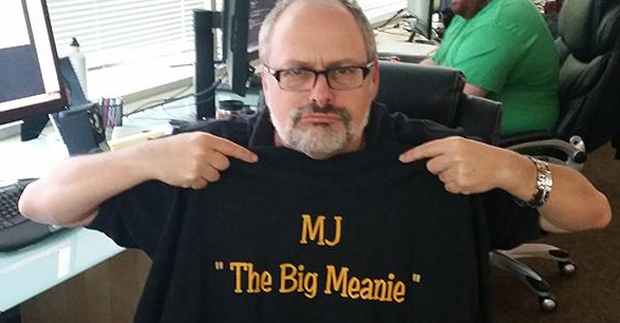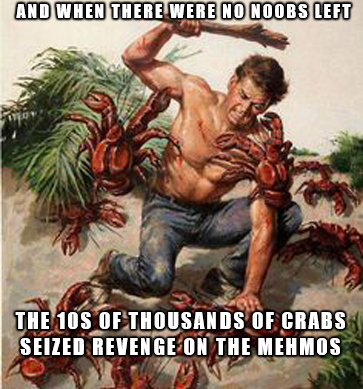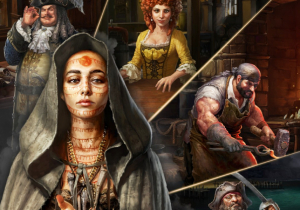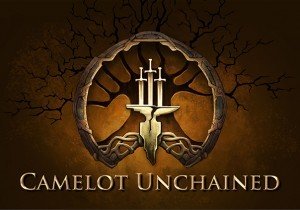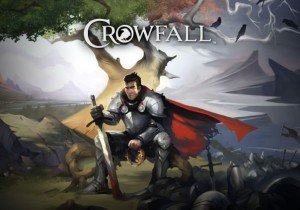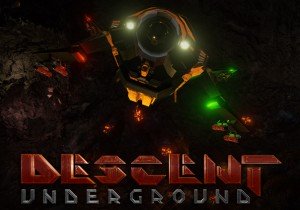MissyS 2016 MMO Predictions – The Decline of MehMOs
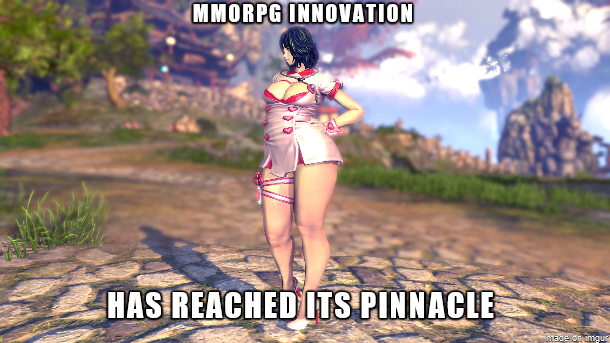
As a veteran player of MMOs, I’ve grown slowly jaded after years of disappointments and drollery. It’s a good attitude to have as a member of the gaming press, as it fosters a more neutral and skeptical perspective when I report on games. On a personal level, though, it’s depressing. The last time I was genuinely excited about an MMO was WildStar, and that crushed my dreams as I kept adding to a long list of things I couldn’t do because they were bugged (some of those bugs still aren’t fixed, either). Now, even the hype of Camelot Unchained (which DizzyPW subjects me to at least once a week) doesn’t do anything for me.
Gaming tastes are diverse, and what I find appealing in an MMO is a matter of opinion. What’s been smothering my passion for online gaming isn’t a matter of story, graphics, business model, or even design quality. The culprit is mediocrity, a lack of innovation and creativity. 2015’s MMO releases all felt like more of the same, worth little more than a look and a shrug. It’s led me to create a new phrase: M’eh’MOs (meh-m-o’s, or m-eh-mo’s, depending on how you prefer to pronounce it). 2015 was definitely a year of M’eh’MOs, but 2016 is showing some genuine promise. Maybe even my cold, dead gaming heart can be given a little life.
First, let’s take a quick look at two examples of the problem: MOBAs and the “revival” MMO.
MOBA is a Four-Letter Word
I’ve had a sour relationship with MOBAs for a while, but even the industry is getting sick of them.
The real problem with MOBAs isn’t strictly numbers. There are hundreds of classic-style MMORPGs and only a few dozen MOBAs. While there is exhaustion in the MMORPG market (more to come), it’s different to that of MOBAs. The key factor is saturation.
At GDC 2014, League of Legends had claim of 89% of all MOBA players, even if not their primary MOBA of choice. Two years later, while there’s no doubt League has lessened its hold, it’s assuredly still holding the majority share. Despite there being millions of MOBA players world-wide, they tend to fund very narrowly into a select few games. Big MOBAs stay big, and small new MOBAs (like Infinite Crisis and Rise of Incarnates, both fatalities in 2015) wither and die. A good MOBA isn’t the best designed one; it’s the one with a large community, a strong competitive player base, and support for eSports. Smaller MOBAs generally can’t compete with this, and it takes innovation like Vainglory’s intuitive mobile interface and from-scratch design, or a twist like Smite’s third-person shooter camera angle, to make its own fortune.
What should seem obvious to game developers isn’t as flavor of the month sales has blinded their reason, despite the risk of high investment costs and low returns for new MOBAs entering the market. While I don’t think we’re free of the “MOBAMOBAMOBA” chant just yet, I think 2016 will see a strong decline in new MOBAs entering the market as more small MOBAs fail to sustain themselves, and the gaming community makes it clear a new MOBA is not what they’re looking for.
Revival MMOs: Now in Nostalgia Vision
Strap on your nostalgia goggles, because nothing gets the general gaming community excited these days like a return to their favorite games. Like most gamers, there are many games I remember fondly, and unsurprisingly many of them are seeing a revival in some form in the near future, including Descent and Wing Commander. In both of those cases (Descent: Underground and Star Citizen, respectively), games are being built from scratch with modern gaming technology and desires in mind.
Not so with the revival MMO.
What are the “revival” MMOs? A few recent examples are Dungeon Fighter Online, Dream of Mirror Online, and Karos Returns. These are MMOs whom have lost publishers over the years and suddenly emerge from the ashes, promising the same memories players had before. Note, I’m choosing to exclude revivals like Cabal II or Archlord II, and coming soon, Lineage: Eternal, which were newly developed and stand (or fall) on their own merits. Revival MMOs are simply republished games, if not given a little polish along the way.
To be fair, revival MMOs aren’t always bad. Often they’re simply outdated, designed for a different era of online gaming which catered to higher latency, grinding as progress, and a younger audience with more time to kill. Now they’re catering to that same audience, older now, and with (presumably) more money to spend. Look at the ridiculousness of the DOMO Kickstarter, for example. DOMO had already been funded and ready to launch, so the Kickstarter wasn’t to help get funds to get the game live. Instead, Suba Games used Kickstarter as a promotional gimmick, promising both personal rewards (like founder’s packs) and community rewards (like getting Psy to create a song for DOMO) for pledges. While the community didn’t come close to reaching the Psy goal, almost 200 people pitched in over $6,000 USD for a glorified relaunch party. People will pay for nostalgia, even if they find themselves disinterested or disappointed later. Don’t think for a moment that game publishers don’t know this: they’re in the business of making you buy their games (or stuff in their games, in the case of free to play).
Not all revival MMO publishers may be in it for the money. Neople’s republishing of Dungeon Fighter Online is not the effort of a money hungry publisher, but rather a developer regaining control of a game it was passionate about. This allowed them to exert complete control over content updates, delivering several since the game’s relaunch, along with keeping its cash shop and business model in check with the community’s needs. While DFO isn’t really new, it at least is an MMO brought back with a purpose other than exploiting our brain’s predilection for the past.
How 2016 Can Fix it
Every so often, I hear the phrase “MMOs are dying.” The statement is nonsense. We live in a technological world where online interaction has become a modern staple. To suggest that gamers are going to just retreat into single-player games and lobby-based arenas is simply illogical, as it suggests online gaming is either dull or our culture has evolved beyond it to a new medium. It’s a blatant exaggeration to a real problem: MMOs are stale, and not just because of MOBAs and republished MMOs. Blame lack of innovation.
Most new MMO releases in the past two years have been hyped up but ultimately fail to deliver. It’s like having a plain, white bread, peanut-butter-and-jelly sandwich served to you on a silver platter. It may look fancy, but it’s the same sack lunch you’ve had for years. The problem is twofold: developers aren’t pushing technology, nor are they taking significant risks. To cut costs nearly every MMO these days is developed on one of five engines for crying out loud. It’s no wonder it all comes out somewhat the same.
In the days of online gaming, playability is king. For developers and publishers alike, it’s crucial that a game maximize its potential player base by keeping technical specifications within limits. Players rarely want to upgrade their computers in order to play a single title, especially more casual PC gamers. And ESPECIALLY the free to play market. I’m willing to wager that the constant rise in console and mobile titles is not simply a fad, either. It supports the idea of technological accessibility: reaching a market of players who don’t have to check their system requirements or pay for upgrades to play a game. So when it comes to pushing boundaries of graphics, memory, and processing, online games are behind an already slow curve.
The risk argument is one we’ve reiterated before: the larger a gaming developer, the less risks that are taken. There are many reasons why this correlation exists, enough to make a short thesis paper. I confess my clear bias toward independent and small developers, though I have my share of love for the “big guys” too. I’m also not claiming sole fault of the developers for this phenomenon; consumer mindset is also partially to blame. There are a multitude of additional factors with online games that make risks even less rewarding. A major one of these is sustainable player bases. No matter how great and innovating a game might be, if there aren’t enough players online to support its multiplayer content, it will die. New concepts also take time and skill to introduce to players, some of which will leave when frustrated by the unfamiliar. There are certainly small steps being made in MMO development, but they’re so slight, you’ll see them take place over the course of years.
Yet I predict that 2016 will see some real trend-breakers, brave and bold enough to succeed in a difficult market. These new games, as they gain more attention through testing and launch, will shake the status quo and lead to a newer era of online gaming. Some of these games, we’re already familiar with: Crowfall, Star Citizen, and Black Desert are all strong examples of bold new moves in the online gaming industry. New games will also continue to appear throughout the year; in fact, Hero’s Song – a new rogue-like from another team of grizzled game developers – was announced as I was finishing this article. Each will have its own merits, but let’s take a look at one example of a game in development that addresses both technological stagnation and risk-taking: Camelot Unchained.
A Case Study: Camelot Unchained
If you’ve hung around the forum at all you’ve probably seen a quote in DizzyPW’s sig:
I’d rather risk confusing some people than disappointing them.
-Mark Jacobs
Mark Jacobs is one of the visionary minds behind Camelot Unchained, a name known well by veterans of Dark Age of Camelot. At its core, Camelot Unchained is a re-imagining of Dark Age of Camelot, a tri-realm fantasy MMORPG with a heavy focus on PvP. “CU” isn’t a revival MMO, nor is it a carbon copy of the relatively common tri-realm PvP game. What makes the game different isn’t the type of game it is, it’s how it gets there.
We’ve already written thousands of words about how impressed we are with Camelot Unchained and constantly detail what new developments are coming along, so I’ll get to the point. First, technology. City State Entertainment formed an early partnership with NVIDIA in order to integrate PhysX and Gameworks. This technology will enable CSE to run Camelot Unchained mirrored on both the player’s computer and the server, preventing client-side hacks. Camelot Unchained’s user interface is built as open-source code through Chromium. In-game chat can be accessed through virtually any platform thanks to XMPP technology. And to top it off, CSE can apply patches live to servers at any moment, pushing changes through instantaneously to all players and significantly reducing downtime. This is just a taste of how Camelot Unchained is setting aside the old model of MMO programming and maintenance while offering a solid new platform that promises to host thousands of players in battle simultaneously without the slightest bit of lag.
As for taking risks? The list is just as long, even if it is ‘confusing’. One of the most striking items is the AIR (Action, Interaction, and Reaction) system used for the game’s magic, which allows spells and projectiles to interact with each other dynamically. Whether it’s allies bolstering a single spell, the interaction of opposing spells to create new ones, or the way spells affect and change the battlefield itself, CU’s magic system is the most complex and intelligent we’ll ever see in an MMO. Magic and physical abilities alike will be hand crafted by the player with an incredible level of detail. Crafting will be crucially necessary: so much so that crafters are their own class with separate mechanics that offer engaging gameplay instead of staring at progress bars. Oh, and the game’s map is dynamic, made of islands that group and shift toward each other based on what realm owns them. You know, all the usual stuff …
… has been thrown out the window. I’m skeptical, and I haven’t spent any money backing Camelot Unchained, but from what I’ve seen and heard, Camelot Unchained is not just building big promises: it’s ready to deliver. Much of what I’ve talked about has already been working successfully in testing so far. Should Camelot Unchained truly reach a final stage and launch to the public, it will be the first in a new era of MMOs.
2016: Let the Upheaval Begin
Like many of you, I’m bored of M’eh’MOs. The format has been so ironed out it’s now shapeless and uniform. I’ve been restlessly waiting for the revolution: not the death of the MMO, but its transformation into a new era of gaming. Technology’s growth has finally slowed down enough that gaming can catch up. Big ideas are taking shape, taking risks, and preparing to blow us away. My prediction? The revolution begins this year, with betas (at minimum) for Camelot Unchained and Star Citizen, along with other envelope-pushing titles. The M’eh’MO isn’t dead yet, but this year will see the tide in the war at last swinging out of its favor.
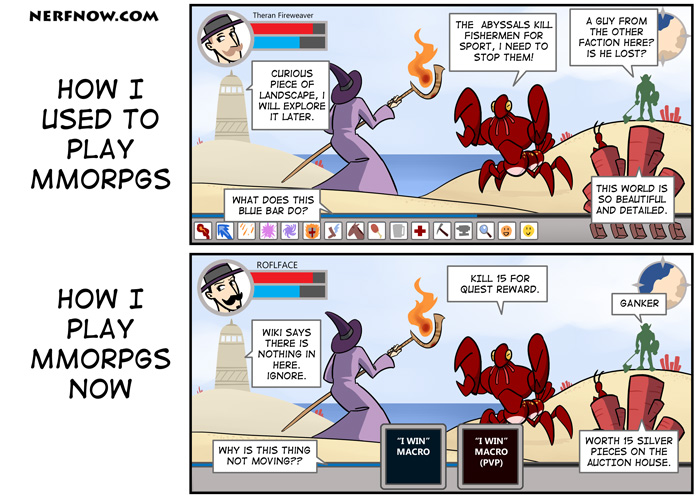
Articles You May Enjoy
- RF Online Coming To GamesCampus
- GamesCampus has announced that it will bring RF Online back to North America.
- Taking a Spin On The Cycle (Preview)
- There’s generally two ways to make it big in the gaming industry. You either do something first, or you do something better than anyone else...
Videos You May Enjoy
-
Freakaleptic
-
Blade of the storm
-
N
-
ᙅᒪᗢᗩḰ –






